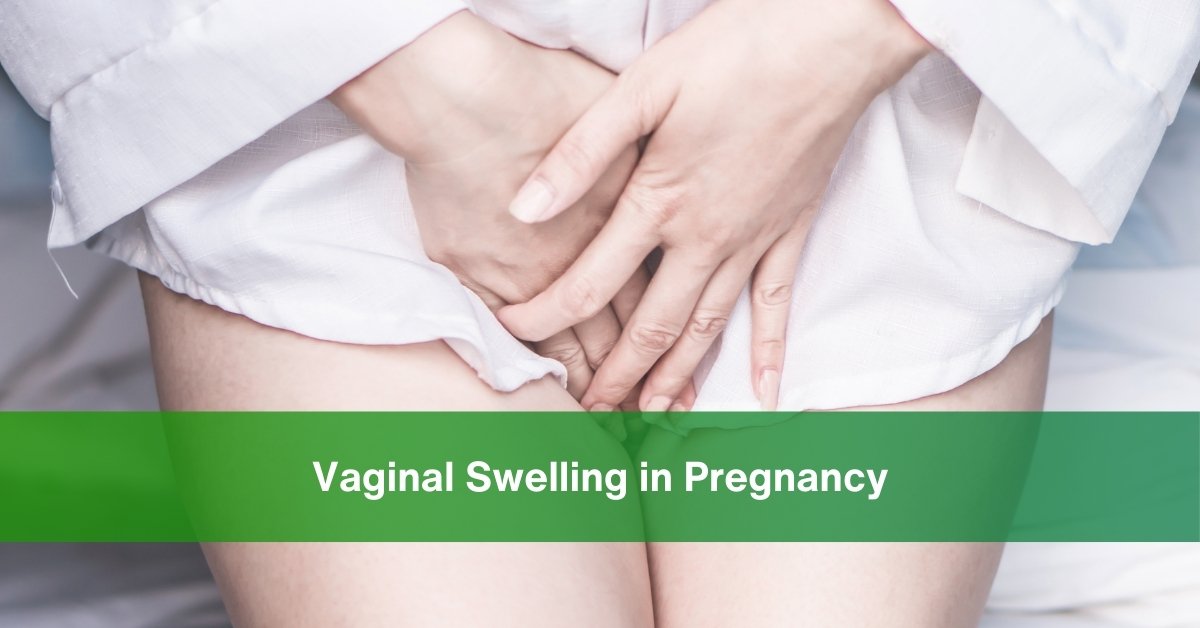Table of Contents
ToggleIntroduction
A pregnant mother goes through various changes, and vaginal swelling is one such thing.
While many believe that swollen hands and feet are common during this time, vaginal swelling in pregnancy is often overlooked.
It refers to an increase in size or puffiness of the vaginal area, including the vulva (labia), that often comes along with discomfort or a feeling of heaviness.
Swelling in labia during pregnancy is different from vaginal swelling, though both are located in the same region.
Labia is the outer lip of the vulva and the swelling appears more external and visible.
Whereas vaginal swelling occurs inside the vaginal canal and is harder to notice and causes discomfort.
Is vaginal swelling common during pregnancy?
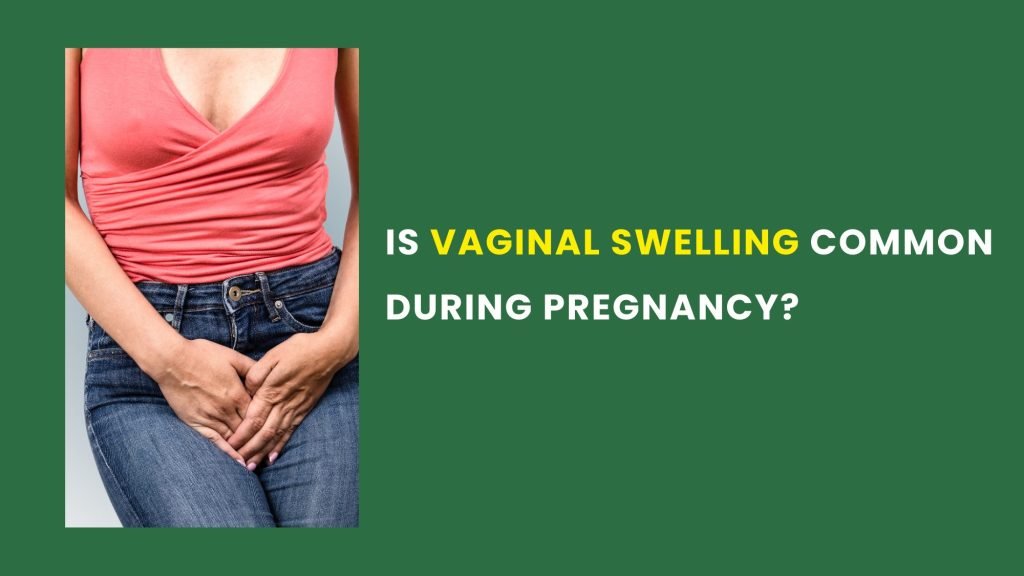
Vaginal swelling is common for most women during pregnancy. In most cases, vaginal swelling in pregnancy can be caused due to various factors including increased blood flow, hormonal changes and excess fluid content in the body.
Vaginal changes during pregnancy
Vaginal swelling happens when extra blood flows through your vaginal area and makes you feel uncomfortable.
But this is not the only vaginal change your body undergoes. Other unexpected ways that can affect your vagina during pregnancy are:
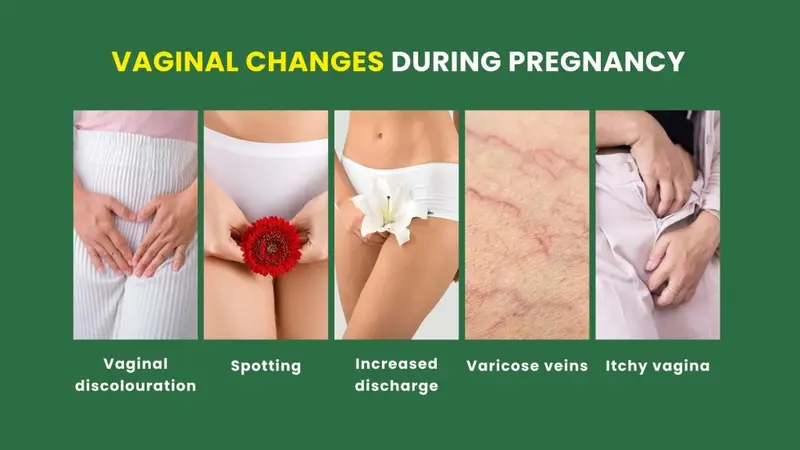
Vaginal discolouration
It refers to the darkening of the skin around the vaginal area, often taking on a bluish or purplish color.
It occurs because of increased blood flow and changes in hormone levels.
The phenomenon is referred to as a Chadwick sign, which is also one of the early pregnancy signs.
Spotting
Spotting during pregnancy is light bleeding that can happen at various stages. It’s usually much lighter than a period.
But it’s a serious issue if you suffer from severe vaginal bleeding so contact your gynecologist immediately.
Increased discharge
You are likely to notice more vaginal discharge, which is thin and milky in texture.
It’s your body’s way of keeping your vaginal area clean and free from infection.
Though it’s completely normal, you might experience foul odour or mild discomfort.
Varicose veins
While varicose veins are the most common occurrence in your lower body part, they can also appear near your vagina.
It is usually caused by pregnancy hormones, a bulged uterus and an increase in blood flow.
Itchy vagina
During pregnancy, your vagina might get itchy along with redness, unusual discharge, swelling due to hormonal changes, yeast infections, bacterial vaginosis or increased discharge.
Symptoms of vaginal swelling during pregnancy
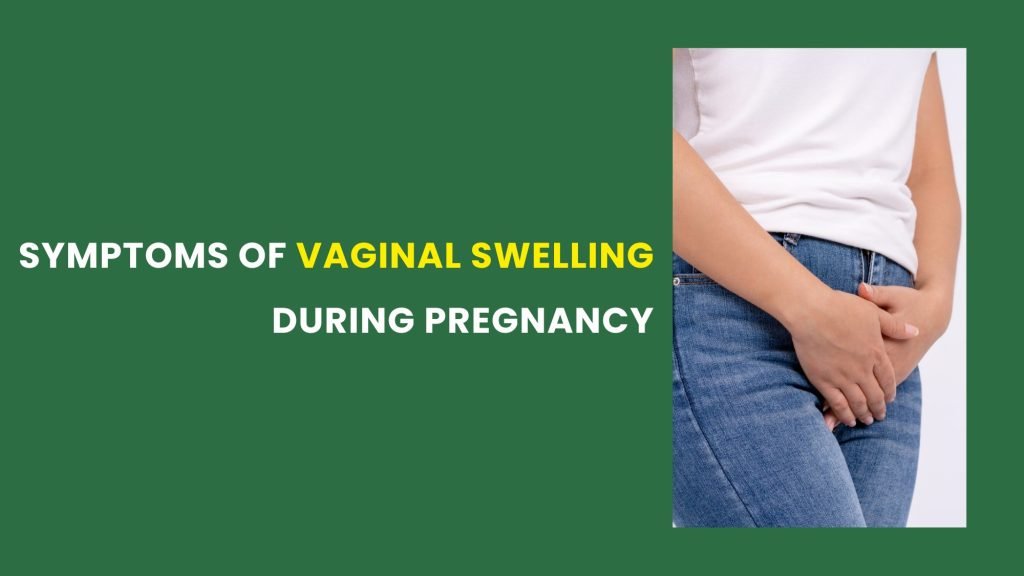
Vaginal swelling in pregnancy is common and can be identified with a range of symptoms. Some of the usual ones are:
- Visible swelling in your vagina, where you might notice puffiness or a swollen appearance around the vulva and vaginal area.
- Redness in the vagina, vulva, labia and the surrounding area and you may feel irritated.
- Vaginal swelling in pregnancy can cause the skin around the area to feel irritated or itchy.
- Mild pain or aching, especially after prolonged standing or sitting.
- Increased sensitivity in the vagina. You might find the vagina more tender or sensitive to touch.
- Vaginal swelling can sometimes interfere with urination and cause a sharp, stinging sensation when you urinate.
What causes vaginal swelling during pregnancy?
Vaginal swelling in pregnancy is caused by multiple reasons, such as:
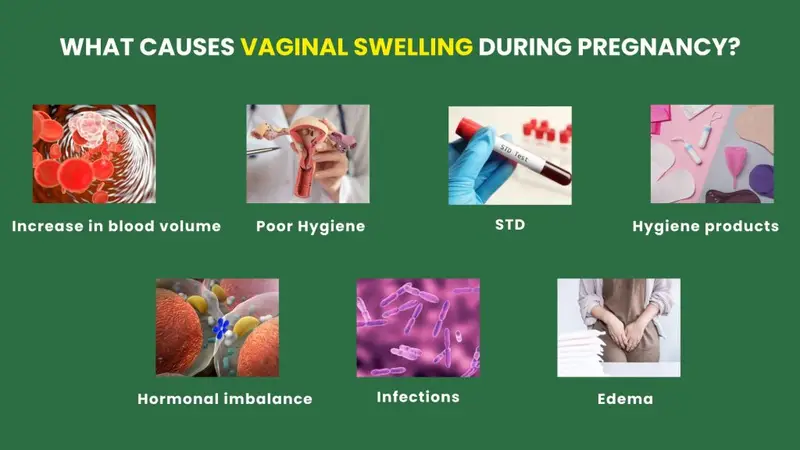
Increase in blood volume: During pregnancy, blood volume increases to support the baby, and as the uterus grows, it puts pressure on blood vessels in the pelvis.
This combination often causes swelling. Also, vaginal swelling in the third trimester is common because your baby gains weight and drops lower in your pelvis.
The pressure can result in swelling of genitals such as the vagina and perineum.
Poor Hygiene: Poor hygiene can lead to an increase in microbial activity in the vaginal area, leading to an increased growth of bacteria and other microorganisms causing inflammation and swelling.
STD: STD (sexually transmitted diseases) like gonorrhoea contracted through direct sexual contact can cause infections that lead to the bacteria growing in the vaginal area.
It leads to inflammation and swelling, along with other associated symptoms.
Hygiene products: Certain hygiene products, perfumes or soaps that you use can cause allergic reactions or irritation in the vaginal area. The irritation can result in extreme itching, redness and inflammation.
Hormonal imbalance: The fluctuating hormone levels can lead to increased vaginal discharge and the shedding of internal tissues.
This change can affect the body’s natural balance and make it easy for bacteria and fungi to grow, causing swelling in the vagina.
Infections: Infections such as yeast infections and bacterial vaginosis can also be the cause for vaginal swelling during pregnancy.
They can occur due to wearing tight clothes, intake of certain antibiotics, prolonged exposure to water or moisture leading to microbial growth.
Edema: Edema is a kind of swelling that is caused by excess fluid in the body.
It can appear in the vagina when lymph nodes or veins don’t drain properly and result in vaginal swelling.
How to manage vaginal swelling during pregnancy?
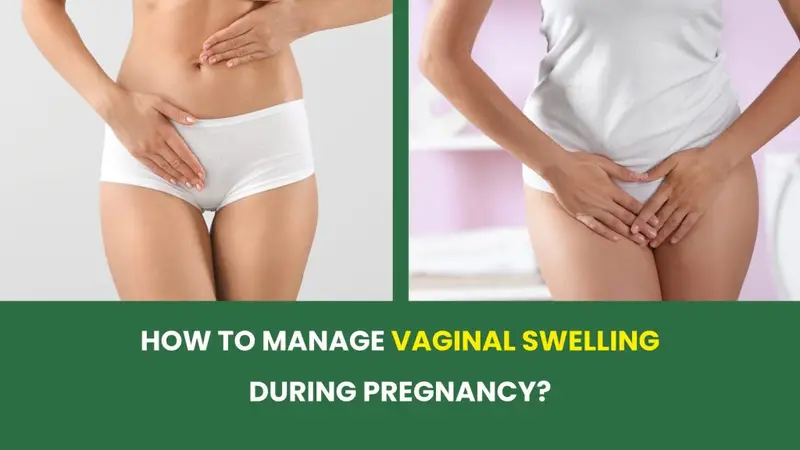
Managing vaginal swelling in pregnancy involves a few simple steps to help reduce discomfort:
- Drink plenty of water to reduce fluid retention and swelling.
- Avoid standing or sitting for prolonged periods of time. Take frequent breaks to relieve pressure on the pelvis.
- Elevate your legs to improve blood circulation.
- Use cold compress. Taking an ice pack or cold compress to the area can help reduce swelling and soothe discomfort.
- Wear loose clothing to avoid irritation and improve comfort. Get straps, which are specially designed compression garments, or underwear that can handle vulvar varicosities.
- Keep the vagina clean and dry to prevent infections that could worsen swelling.
When should I be concerned about vaginal swelling during pregnancy?
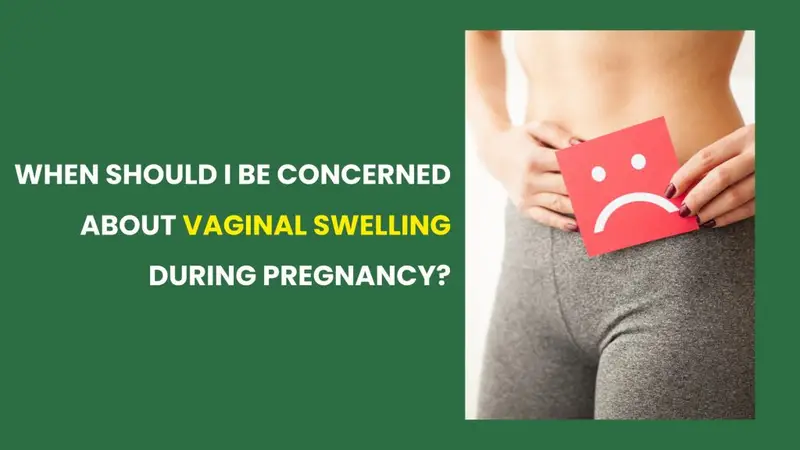
Swelling in the vagina is quite normal during pregnancy. However, you must visit the doctor if you are experiencing vaginal swelling along with:
- Symptoms of a yeast infection
- Itching in the vaginal area
- Vaginal discharge.
Conclusion
Vaginal swelling during pregnancy is quite normal. Increased blood flow, hormonal changes, vaginal discharge and your pregnant body’s ability to retain more fluid can cause vaginal swelling in early pregnancy and this continues till the delivery.
Post-childbirth, this swelling disappears within a few days to a few weeks.
While it can be uncomfortable, it is usually harmless. However, if the swelling is caused by infections, consult your gynecologist.
In addition, if the swelling in the vagina is accompanied by severe pain, unusual discharge or persistent swelling, consult your doctor immediately.
For appointments and consultations with the best gynecologist in Chennai, Dr. Deepthi Jammi, contact Jammi Scans at 7338771733.
Chennai women’s clinic is now Jammi Scans
FAQs
1. How do you get rid of an itchy and swollen private area during pregnancy?
Some quick measures to take to treat a swollen and itchy vulva in pregnancy during pregnancy are:
- Gently wash the area with an odorless vaginal wash.
- Wear loose and comfortable clothes.
- Avoid wearing underwear to sleep.
- Choose cotton underwear, as synthetic clothing can make your vagina sweaty.
- Apply a cold pack or compress to help soothe itching and reduce swelling.
2. How long does pregnancy swelling last?
Pregnancy swelling is common during pregnancy, especially in the third trimester, as swelling peaks and becomes normal within a few weeks after childbirth.
3. Can vaginal swelling be a sign of an infection?
While vaginal swelling in pregnancy is quite common, it can also be a sign of an infection. Especially if it occurs along with symptoms such as burning sensation, unusual discharge, foul odour, redness and itching. If you show these signs, get in touch with your gynecologist immediately.
4. Can vaginal swelling affect my baby?
Generally, vaginal swelling doesn’t affect the baby. However, if the swelling is accompanied by an infection, it’s essential to get treated because certain infections can pose risks during pregnancy and cause immense discomfort.
5. Will vaginal swelling go away after pregnancy?
Yes, vaginal swelling usually disappears after childbirth but the timeline can vary for every woman. Mostly, this swelling is temporary and it takes a few days to weeks to subside.
Deepthi
Dr. Deepthi Jammi (Director, Jammi Scans) is a qualified OB/GYN and Post-Doc in Maternal Fetal Medicine. As a pregnancy ultrasound expert, she is passionate about healthy pregnancies and works towards spreading awareness on the latest diagnostic options available for parents to choose from. Dr.Deepthi has received gold medals and awards in Fetal Medicine at international and national conferences, and has appeared in numerous prestigious regional magazines and TV interviews.


